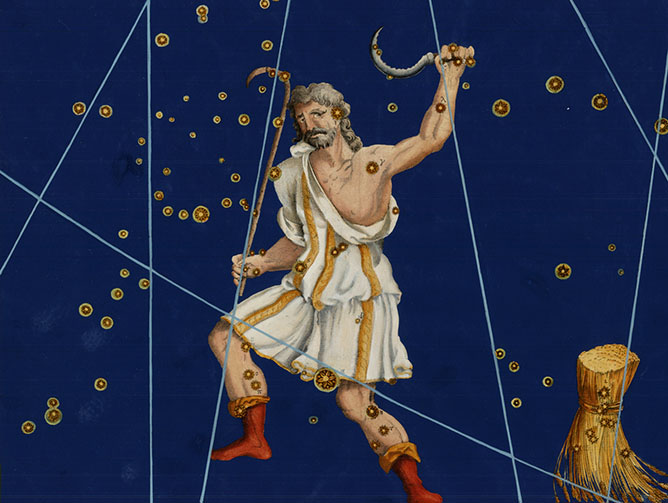Boötes: The Herdsman
Pronunciation: bo-OH-teez Boötes as depicted by Johann Bayer in his Uranometria (1603). Source image provided by www.RareMaps.com — Barry Lawrence Ruderman Antique Maps Inc.
Boötes as depicted by Johann Bayer in his Uranometria (1603). Source image provided by www.RareMaps.com — Barry Lawrence Ruderman Antique Maps Inc.
| Boötes Constellation Profile | |
|---|---|
| Abbreviation: Boo | Genitive: Boötis |
| Origin: Ancient | Location: Northern Hemisphere |
| Best View (North): Spring | Best View (South): |
| Bordering Constellations: Draco, Ursa Major, Canes Venatici, Coma Berenices, Virgo, Serpens Caput, Corona Borealis, Hercules | |
The Story Behind the Constellation Boötes
Boötes is connected to several legends, many of them tied to the neighboring constellation, Ursa Major. The name Boötes comes from the Greek for word for ox-driver” or “herdsman”. One myth for Boötes is that he was Philomelus, son of Demeter, the goddess of agriculture. He was the inventor of the plow, and upon his death, was placed in the stars. The brightest stars in Ursa Major are sometimes refered to as “the plough”. Another myth linked to Boötes has many variations. In one of these, Boötes is Arcas, son of Zeus and Callisto. To protect Callisto from the jealousy of Hera, Zeus disguises his paramour by turning her into a bear. Arcas is raised by Maia, the mother of Hermes. Many years later Arcas has become a masterful hunter and comes upon his mother in bear form. Callisto recognizes her son and tries to greet him but her words only come out as growls. Arcus is about to kill her when Zeus, taking pity, places them in the stars as Boötes and Ursa Major.Boötes Constellation Points of Interest
Interesting stars and objects.Bright Stars in Boötes
These are the stars in Boötes with a minimum magnitude of 3.0.| Name | Bayer Name | Magnitude | Color | Luminosity | Distance |
|---|---|---|---|---|---|
| Arcturus | Alpha Boötis | -0.04 | Yellow/Orange | 298 suns | 37 ly |
| Izar | Epsilon Boötis | 2.35 | Orange | 605 suns | 203 ly |
| Muphrid | Eta Boötis | 2.68 | Yellow | 6.5 suns | 37 ly |